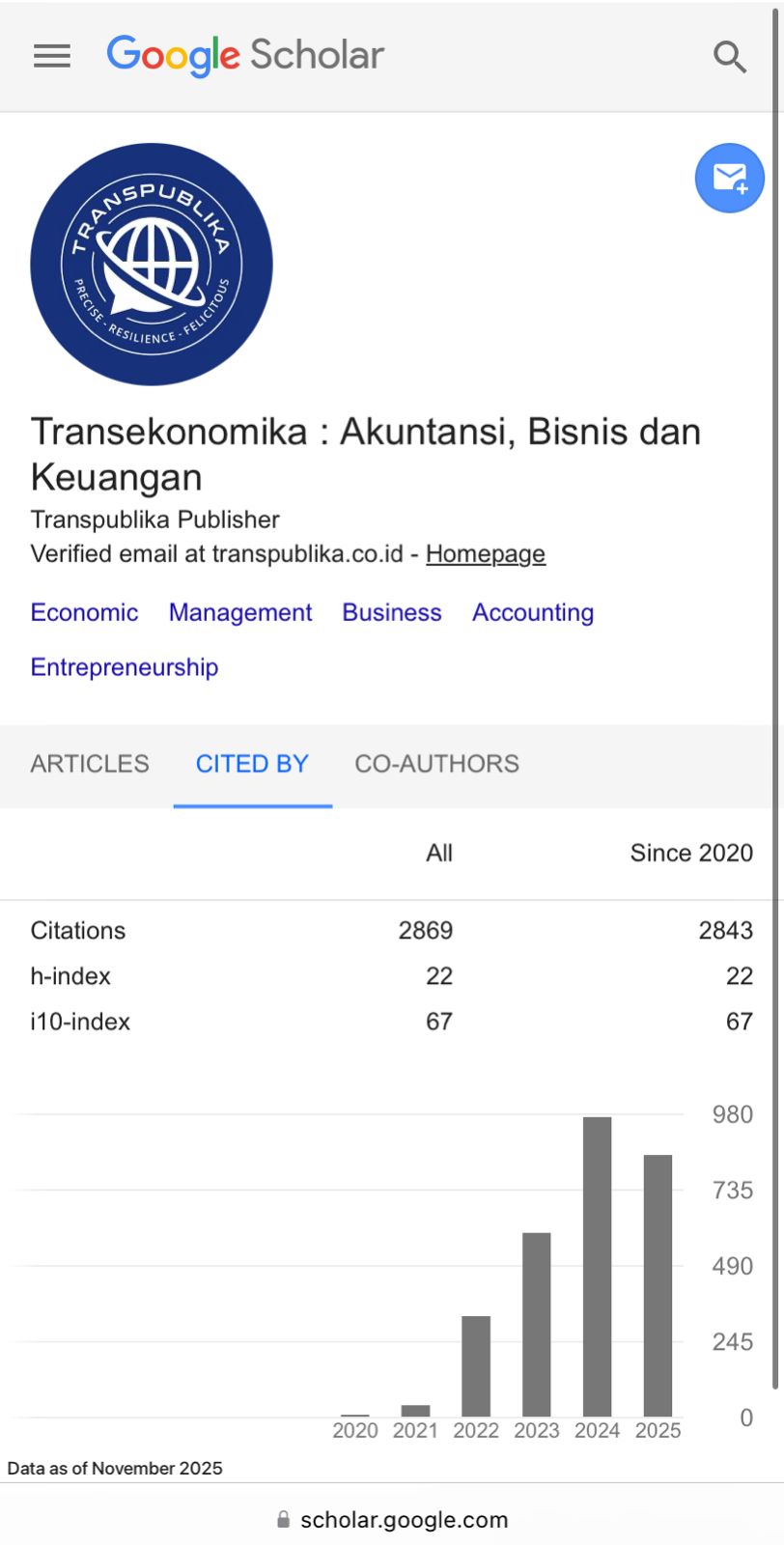STUDI KUALITATIF FAKTOR KINERJA KARYAWAN PADA PT. XYZ SELAMA MASA PANDEMI COVID-19
Abstract
In the modern era of Covid-19 and the ongoing new normal modernization process, the business world is required to be more responsive to all innovations that occur in order to be able to survive, continue to develop, and achieve its goals. Therefore, the company will be able to compete with other businesses if the performance of its employees is competitive. This study aims to identify employee performance factors at PT. XYZ during the Covid-19 pandemic. This research is a qualitative descriptive study. Determination of the subject through the use of deliberately selected sampling. Interview and observation are the two main methods used in the data collection process. The findings show that in terms of leadership style, their leaders encourage them to take the initiative, and their leaders let their employees carry out tasks in a way that employees find most effective. Relations between employees in the workplace are still quite good. For example, if one employee is having a hard time, there are several other employees who care or are willing to help, and that employee is not hindered in his work. This will affect employee performance, and employees will feel more comfortable working if facilities are available. Besides, PT. XYZ shows the company's employees that they are not given any gifts or rewards in the company as part of the work motivation program they participate in.
Downloads
References
Aamodt, M. G. (2015). Industrial/organizational psychology: An applied approach. Cengage Learning.
Aboshaiqah, A. E., Hamdan-Mansour, A. M., Sherrod, D. R., Alkhaibary, A., & Alkhaibary, S. (2014). Nurses’ perception of managers’ leadership styles and its associated outcomes. American Journal of Nursing Research, 2(4), 57–62.
Amaliyanti. (2022). Pengaruh Motivasi Kerja Dan Lingkungan Kerja Terhadap Kinerja Karyawan Di Pt Era Mulia Abadi Sejahtera. 11(1).
Asmiadi, A., Bahri, S., & Pasaribu, S. E. (2022). Peran Mediasi Motivasi Pada Pengaruh Kepemimpinan Dan Lingkungan Kerja Terhadap Kinerja Pegawai Di Kantor Sekretariat DPRK Kota Subulussalam. Jesya, 5(2), 1364–1380. https://doi.org/10.36778/jesya.v5i2.737
Bell, E. E. (2008). Exploring employee perception of the work environment along generational lines. Performance Improvement, 47(9), 35–45.
Daniel, E. G. (2010). Strategies for employee recruitment, retention and performance: Dimension of the Federal civil service of Nigeria. African Journal of Business Management, 4(8), 1447–1456.
Davis, K., & Newstrom, J. W. (1993). Organizational behavior: Human behavior at work. McGraw-Hill.
Earle, H. A. (2003). Building a workplace of choice: Using the work environment to attract and retain top talent. Journal of Facilities Management.
Eisenberger, R., Cummings, J., Armeli, S., & Lynch, P. (1997). Perceived organizational support, discretionary treatment, and job satisfaction. Journal of Applied Psychology, 82(5), 812.
Firmansyah, N. A., & Maria, V. (2022). Pengaruh Kepemimpinan, Budaya Organisasi Dan Motivasi Kerja Terhadap Kinerja Karyawan Pada Pt. the Univenus Serang. JIP (Jurnal Inovasi Penelitian), 2(12), 3841–3848.
Hafeez, I., Yingjun, Z., Hafeez, S., Mansoor, R., & Rehman, K. U. (2019). Impact of workplace environment on employee performance: mediating role of employee health. Business, Management and Economics Engineering, 17(2), 173–193.
Kundu, S. C., & Gahlawat, N. (2016). Effects of employee retention practices on perceived firm and innovation performance. International Journal of Innovation and Learning, 19(1), 25–43.
Lub, X., Bijvank, M. N., Bal, P. M., Blomme, R., & Schalk, R. (2012). Different or alike? Exploring the psychological contract and commitment of different generations of hospitality workers. International Journal of Contemporary Hospitality Management.
Muardi, J., Rohmawan, K., & Nurminingsih. (2022). The Effect Of Discipline And Training On Performance Of Employees At The Fire And Rescue Service In City Administration Of Central Jakarta. MARGINAL : Journal Of Management, Accounting, General Finance And International Economic Issues, 1(2), 83–92. https://doi.org/https://doi.org/10.55047/marginal.v1i2.137
Nandutu, J., Magolo, A., & Gimuguni, L. (2014). Effect of Leadership Styles on Performance of Local Governments in Uganda. A Case of Mbale District.
Pancasila, I., Haryono, S., & Sulistyo, B. A. (2020). Effects of work motivation and leadership toward work satisfaction and employee performance: Evidence from Indonesia. The Journal of Asian Finance, Economics and Business, 7(6), 387–397.
Putra, B., & Pasaribu, V. (2022). Pengaruh Gaya Kepemimpinan dan Lingkungan Kerja Terhadap Kinerja Karyawan pada PT. Tumbakmas Niagasakti Bimo. Jurnal Pendidikan Tambusai, 6, 3993–3999.
Rahmawati. (2022). Pengaruh Lingkungan Kerja, Stres Kerja Dan Motivasi Terhadap Kinerja Karyawan. Iain Saltiga, 53(9), 1–122.
Ritonga, A., & Bahri, S. (2022). Pengaruh Lingkungan Kerja dan Kepemimpinan terhadap Kinerja Karyawan Melalui Kepuasan Kerja pada PT. Mode Fashion Medan. Jesya, 5(2), 1427–1442. https://doi.org/10.36778/jesya.v5i2.740
Shobirin, A., & Siharis, A. K. (2022). Pengaruh Kepemimpinan, Lingkungan Kerja, Kompensasi, Dan Motivasi Kerja Terhadap Kinerja Karyawan: Studi Literatur. Transekonomika: Akuntansi, Bisnis Dan Keuangan, 2(5), 235–246. https://doi.org/10.55047/transekonomika.v2i5.188
Walter, F., & Bruch, H. (2010). Structural impacts on the occurrence and effectiveness of transformational leadership: An empirical study at the organizational level of analysis. The Leadership Quarterly, 21(5), 765–782.
Copyright (c) 2022 Alvin Al Faruq

This work is licensed under a Creative Commons Attribution 4.0 International License.








.png)







.png)


.png)

.png)















